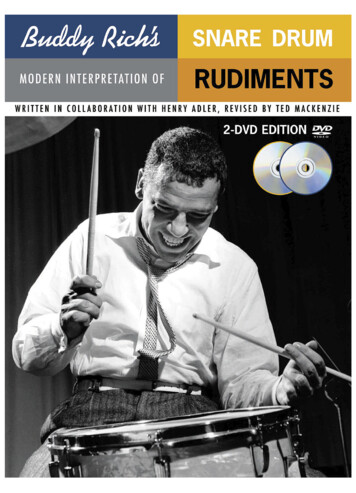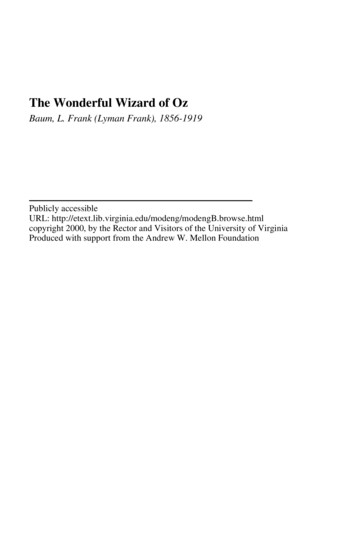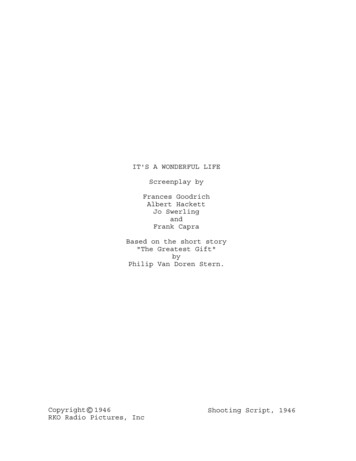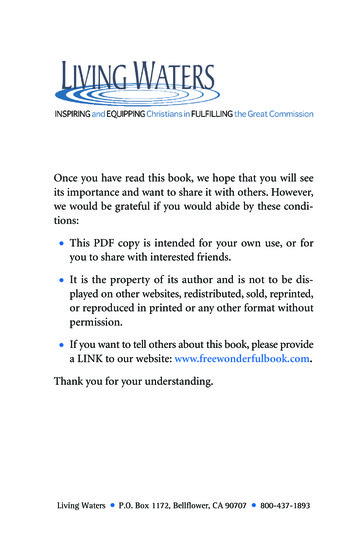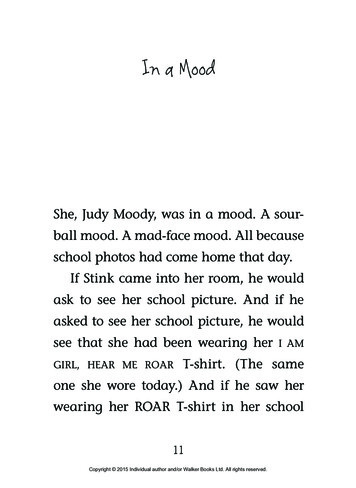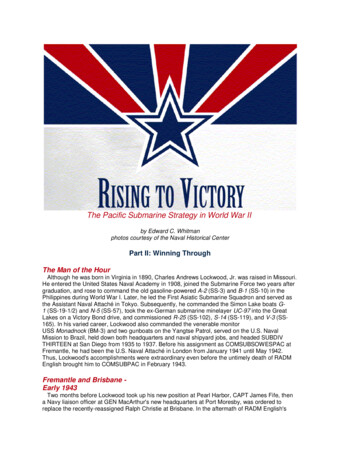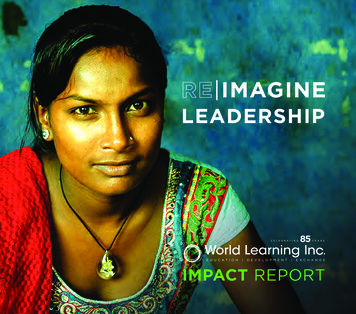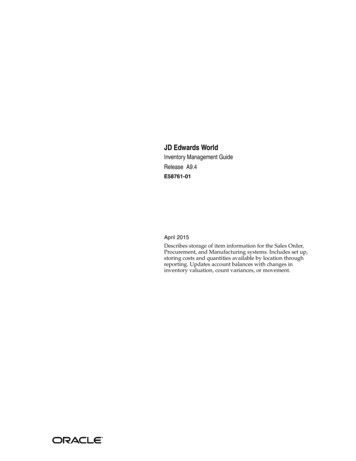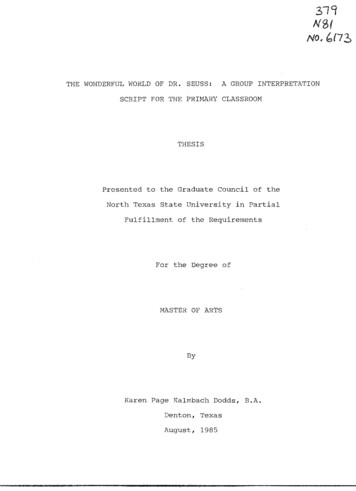
Transcription
THE WONDERFUL WORLD OF DR.SEUSS:A GROUP INTERPRETATIONSCRIPT FOR THE PRIMARY CLASSROOMTHESISPresented to the Graduate Council of theNorth Texas State University in PartialFulfillment of the RequirementsFor the Degree ofMASTER OF ARTSByKaren Page Kalmbach Dodds,Denton,TexasAugust,1985B.A.
Dodds,Seuss:Karen Page Kalmbach, The Wonderful World of Dr.A Group Interpretation Script for Performance in thePrimary Classroom.Address), August,Master of Arts (Communication and Public1985, 82 pp., bibliography,41 titles.This thesis proposed the idea of oral interpretation ofchildren's literature as a pedagogical tool in the primaryclassroom.A group interpretation script entitled "TheWonderful World of Dr.Seuss" was compiled for performancein the primary classroom as a viable vehicle for teaching children to understand and appreciate literature.The script wasevaluated by qualified teachers in the areas of English, oralinterpretation, and elementary education as well as a criticalanalysis by the author.The thesis concluded that oral communication is necessaryin the primary grade and that group interpretation is anexciting way to enhance learning.
TABLE OF CONTENTSPageChapterI. 1.INTRODUCTION.Children's Literature for PerformanceStatement of the ProblemSignificanceScopeReview of LiteratureMethodologyII.ORAL INTERPRETATION AS A TEACHING CONCEPT.17The Classroom as a Verbal CommunityReaders Theatre for ChildrenIII. 31CREATING THE SCRIPT.67.75.76.77. 78.0APPENDIX B.e.0.0. 0. .APPENDIX C.0. 0. 0. 0. 0. 0. .APPENDIX D.0. *. a. 0. 0. *. 0. .BIBLIOGRAPHY.CONCLUSIONS AND RECOMMENDATIONSEVALUATION,A. . . .9.0. APPENDIX. .a.0. . . .*.0.IV.Selecting the LiteratureStaging TechniquesProduction Concept"The Wonderful World of Dr. Suess".0.0. .iii79
CHAPTER IINTRODUCTIONChildren's Literature for PerformanceFor the very youngest children,their first introductionto the world of books occurs when their parents read to them.Similarily,as they enter public school,they do not yet havethe keys to unlock the word symbols on the printed page;therefore,they rely on the teacher to overcome this barrier.As Veilleux,classrooms,an educator who stresses the importance of verbalpoints out,"Reading aloud is a valuable process;it is the link between the spoken word and the written word"(116).Comparing literature to music,he contends thatliterature is essentially designed for the ear.He explainsthat it is through oral reading that one hears the tones ofliterature(Veilleux 116).The child benefits from hearing the musical qualitiesof word symbols.Another scholar in the field of children'sliterature is Wilbert Pronovost,who claims that"Childrenwill enjoy and appreciate good literature if they hear itread aloud well."Further,if literature is to be"anenjoyable experience for the reader and listener it mustbe done skillfully"(192).Robert Whitehead reinforces thisstatement in his address to the Convention of the InternationalReading Association:1
2Beautifulliterature must be heard to be fullyappreciated.The very nature of our professiondictates reading aloud well--to children.Every-day we should read aloud to children a piece ortwo of prose or poetry,for in so doing we arehelping them to see the beauty and fun of literature,to perceive its values,the great literary works,and to appreciateold and new.(84)Whitehead is not alone in his belief that oral readingis an indispensible part of a child's education.At the1969 meeting of the Illinois Council of Teachers of English,members declared the value of oral interpretation in theclassroom.They praised the work of those who were know-ledgeable of the skills of oral interpretation and who usedthese skills in the classroom.The assembly recommended thatclasses in oral interpretation be a requirement for educationmajors(Fernandez 8).This recommendation certainly reflectsits affirmation of oral interpretation as a valuable teachingtool.Children's literature is ideal for oral presentation.This material is,by nature,highly imaginative and is a sti-mulant for a creative experience.stimulate a child's imagination.broadened,A successful reading willTheir reading range isand their limited experiences are enlarged asthey vicariously experience thelives of others.cipate in the reading by listening creatively,They parti-hearing words
3and giving them shapes in their mind.Characters and settingsunfold as the reader supplies the information and the childmentally tunes in the picture.participatesIdeally,the child,as audience,in the reading as actively as the reader.Participating in a performance where the audiencecomprised primarily of children is a delightfulisexperience.children tend to discount the distinctionUnlike adults,between the real world and world of make-believe(Smith 230).They do not question the existence of giants or the credibility of talking animals.performance,Likewise,they accept the presence of scripts,of elaborate stage settings,narrator.then, viewing a groupthe absenceand the direct contact with aAn audience of children is spontaneous,eager,andvery demonstrative in their responses.With ever increasing importance placed on literacy inour society,all possibilities that enhance its achievementshould be explored.If we are to encourage children to read,we must determine what will motivate them.Oral interpre-tation as an academic discipline includes multi-voicedperformancesreferred to by various names,readers theatre,interpretation,preterstheatre.such as groupchamber theatre,and inter-These terms may be used interchangeably.Statement of the ProblemsChildren's literature,is complex,intriguing,like the child it is written for,unpredictable,nation of the child and theliterature,and honest.A combi-in a performance
4setting,can produce a pleasurable and educational experience.The emphasis is on the educational value of oral interpreAnderson and Groff support thistation in the classroom."Oral interpretation is the oldest formeducational concept:of children's literature and is of special interest and valueto children"(4).Children enjoy seeing their peers perform,not tomention the creativity and energy that children add tochildren's literature.ferent manner and,is vivid and fresh.stories by Dr.They conceptualize ideas in a dif-therefore,the physical and vocal outcomeA group interpretation of variousSeuss can exercise a child's creative pro-cesses as well as invoke a sense of unity in working withothers.Whether they know it or not,stories,they discover various meanings and new insightsinvolving the literature.as children interpretLiterature gives pleasure to thechild as well as understanding.As Lukens points out,"Itexplores the nature of human beings, the condition of human-kind"(9).As a performer the child develops performing skills andexpandslanguage growth.merely words,As Lukens emphasizes,"Words arebut real literature must give its readerspleasure and help them understand themselves and others"(23).All evidence indicates that children benefit fromexperiencing literature presented to them orally.It mightbe assumed that even more benefits may be derived if the
5children participate in the literature as performers.Thisthesis proposes to investigate the assumption that such participation will enhance a child's comprehension and appreciationof theliterature performed,and to examine Readers Theatreas a means of achieving that participation.Significance of the StudyThere are many diverse literary genres to explorechildren's literature:fairy tales,fantasy,and picture books.folktales,Today,myths,inlegends,children have theopportunity to meet and enjoy literature through manydifferent media andin various places.Lonsdale and Mackintosh believe that "The trend inmodern education stresses personal growth--certain physical,social andintellectual needs"(16).enhance this educational concept.Good literature canPaul Hazard describesgood literature in this statement:I like books that remain faithful to the very essence of art. . namely,those books that offer tochildren an intuitive and direct way of knowledge,a simple beauty capable of being perceived immediately,arousingin their souls vibration whichwill endure all their lives.Dr.Suess'storiescan be considered good literature.His stories explore as well as fulfillneeds.(5)a child's emotionalExperts in the field support his public recognition.May Hill Arbuthnot,author of Children and Books states,
6"Dr.Suess is fact, fable, fantasy and fun"Editor-in-Chief,Helen Ferris,". Dr.(Commine 311).writes:Junior Literary Guild,gaySeuss a delight for all--inimitable pictures,action, humor,zestful imagination"(Hoffman and Samuels 221).A group interpretation involving various pieces from Dr.Seuss can develop a child's mind as well as the performanceability.Most contemporary audiences expect to see adultperformers in theatre or interpretation presentations.the child performing children'sthesis provides an alternative:literature.ThisA child who understands a piece of literatureas well as vocally expressing the piece can enjoy a verysatisfying experience.Improving the voice and expressingone's self verbally heightens the effectiveness of thecommunication process.The child as an oral reader benefits from the wholeexperience.Through analysis,child makes discoveries of the piece,fellow students.theprior to performance,perhaps unknown toAn extended vocabulary is built by searchingfor meanings of new words and articulating them in performance.author'sThe reader must re-createintent; therefore,concept of the piece.for thelistenertheone must know the major idea andThe child achieves this through ana-lysis and imaginative study of the manuscript.Then,through practice and development of techniques,using thetotal body becomes an exciting experience for the reader andthe listener.As David Thompson says,"In the process,the
7interpreter can transcend his own role as a student ofliterature and become something of an artist himself (140).Responding to literature with voice,face,body,gesture,and the total being comes very naturally to children.Theyare less inhibited than adults and are generally more spontaneous in their reactions.The rhythms of play,running,jumping, and hopping make the child sensitive to the rhythmsand movements in poetry that make its strongest appeal tochildren (Arbuthnot 323).Children who participate in an oral performance ofliterature are engaged in a socialevent,that of sharing.They bring pleasure and appreciation to their listeners butalso add to their own pleasures.Oral interpretation offers an exciting approach to thestudy of literature.Although many ofmeasured in intangiblesas values,its objectives areattitudes,appreciation,one can clearly observe the pleasure gained when exposed tothis dynamic art.Children's literature explores as well as fulfills achild'semotional needs.Security,acceptance,major factors in early childhood development.and love areDeveloping achild's appreciation of good children's literature can benefit children and their environment.Scope of the StudyThis thesis proposes a preparation of a Readers Theatrescript employing children'sliterature as a viable vehicle
8for teaching children to understand and appreciate literaturebased upon the assumption that oral interpretation is neededin the classroom.strates this need.A review of the literature clearly illuA group interpretation script:Wonderful World of Dr.tration."TheSeuss," is the main focus of concen-The script will include only stories by Dr.Suess.It is not the purpose of this study to perform or exploreother forms of literature.concern, middleAs primary grades are the mainschool and high school will not be discussed.With those goals in mind a critical analysis by theauthor as well as professional evaluations will be the majordeterminers to the overall effectiveness of this study.Review of LiteratureThe subject of performing children's literature as aneducational and creative concept in the classroom includesmany areas of concentration.First,thesignificance of anoral approach to literature must be determined.Then sourcesjustifying the correct method concerning the group interpretation approach and the evaluation muasures in relation tothe critical analysis of thescript must be examined.Finally,a discussion concerning the literature chosen for the scriptwill beincluded,as well as a discussion of the author'sintent.Lonsdale and Mackintosh discuss the importance of childrenmeeting certain physical,social,and intellectual needs.These needs can be reinforced with various oral approachesto children's literature.
9There are many studies related to the humanistic needsof the child in relation to children'sliterature.Huckspecifically states the advantages of children's literatureclaiming that it "provides enjoyment,gives vicarious experience,imagination,developsdevelops insight into humanbehavior, and presents the universality of experience"(72).These are educational developments that children must receivein their formulative years.in the field of children'sof child development.There are many significant textsliterature in relation to the area(16),Lonsdale and Mackintoshdealwith the nature of human beings and the condition of humankind.They discuss how good children's literature canfulfill the child's emotional needs as well as develop security,acceptance,and love,childhood development.all of which areAnderson and Groffimportance of oral literature,literature.factors in earlyIn Higgen's book,in Children's Literature,stress the(6),the oldest form of children'sBeyond Words:Mystical Fancythe value of reading literaturealoud is reinforced and implemented as an industrious andeffective teaching tool for language growth.Lindfors (310-15)and Willebrand and Rieke(7-9) provideexcellent evaluations of criticism and response of children'sliterature.examined,Many examples of children's li
stories by Dr. Seuss can exercise a child's creative pro-cesses as well as invoke a sense of unity in working with others. Whether they know it or not, as children interpret stories, they discover various meanings and new insights involving the literature. Literature gives pleasure to the child as well as understanding. As Lukens points out, "It explores the nature of human beings, the .
